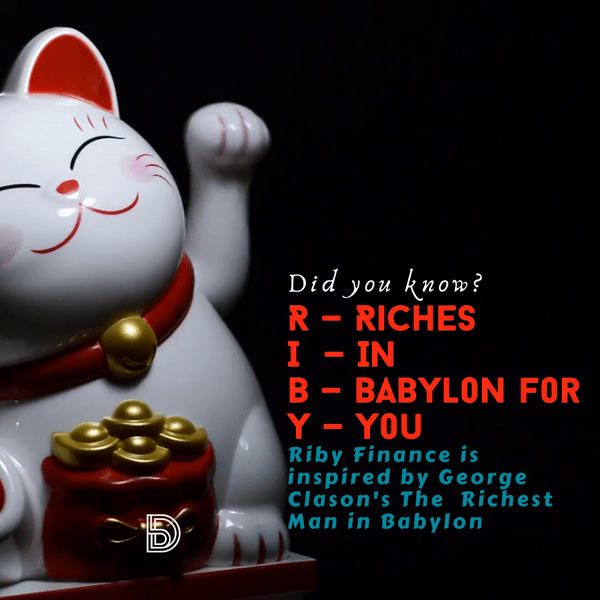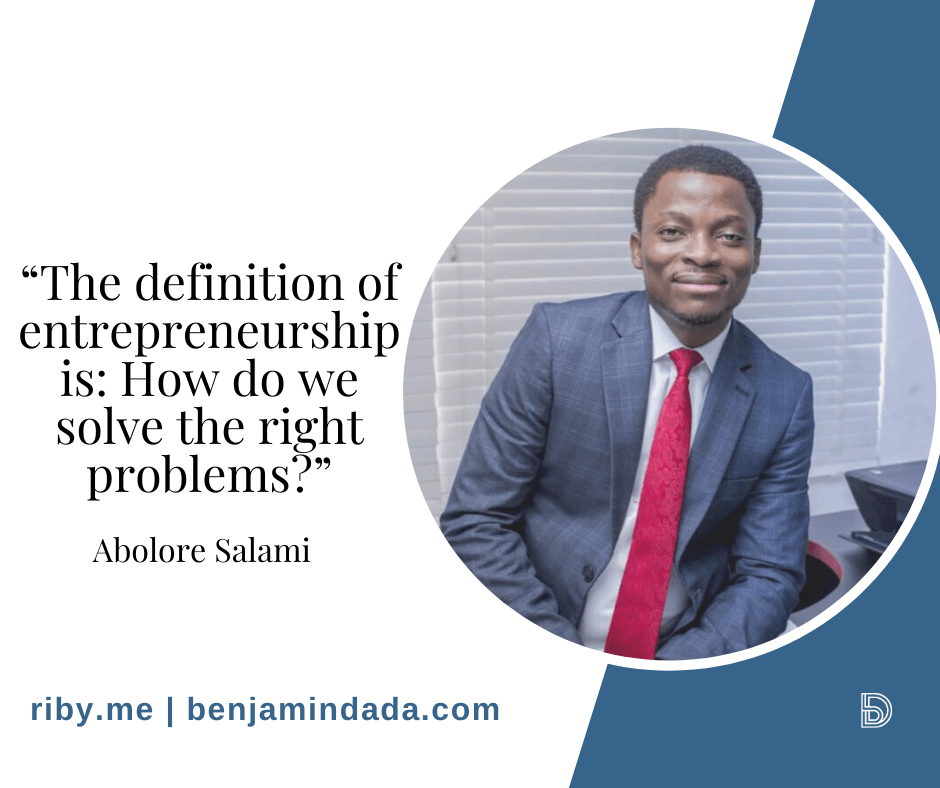A chat with Abolore Salami, Founder of Nigeria's foremost digital platform for cooperatives—Riby Finance
Riby Finance—the foremost digital platform in Nigeria for cooperatives and trade groups—was created to answer the question: How do you create prosperous communities?

Riby Finance—the foremost digital platform in Nigeria for cooperatives and trade groups—was launched to answer the question: How do you create prosperous communities?
Riby officially began operations in May 2016 with three mandates: help people to earn livable income; help people to have a lifestyle of savings and lifetime of wealth; help people to own a home.
Speaking with benjamindada.com, Abolore Salami, the founder of Riby Finance, explained that helping people to own a home is really important to the mission of Riby, which is to create prosperous communities and enable people to create wealth and get rich. —
Salami said: "Communities cannot be prosperous when people don't have where to live; when they are living on the streets or paying ridiculous amount in rent—what happens when they don't earn any income and can't pay rent?
Housing or shelter is a key component of prosperous communities. So, helping people to save to own a home is one of the fundamental elements of creating prosperous communities that we can participate in.
Indeed, in a prosperous community, people can easily satisfy their physiological, self-care and safety needs which include food, shelter, healthcare, entertainment, and personal security.
Although some of the elements of prosperous communities are under the prerogative of the government, stakeholders in the private sector can also move the needle.
Riby primarily targets the underbanked and unbanked through trade groups, associations, communities, bevy of small- and medium-sized enterprises, cooperative societies and cooperatives within a company. Riby supports the groups and enable their members to earn livable income, have a lifestyle of savings and lifetime of wealth, and own a home.

According to the research done by an organisation promoting financial inclusion in Nigeria, Enhancing Financial Innovation and Access (EFInA), 60.1 million Nigerians are unbanked. Against this backdrop, Riby launched a campaign in 2019 to reach 1.5 million unbanked Nigerians.
"In the next 12 months or so, we would have achieved that," Salami told benjamindada.com. In February 2018, Riby had celebrated a milestone of one million users of its Cooperative Banking solution.
1 million plus users on Riby Cooperatives Banking! We say a Big thank you to our clients,partners and users. We couldn't have come this far without you. #Riby #Cooperatives #Fintech pic.twitter.com/AraN4CQYe5
— Riby (@RibyFinance) February 13, 2018
Riby Finance Life Technologies Limited, which operates as Riby Finance provides digital solutions and financial services. Riby's services include Riby Enumerator—which helps individuals and businesses to capture data, Riby Agent, and Riby CoBanking—a digital solution for cooperatives and groups which allow their members to have easy access to financial services.
"There are digital solutions we partner with companies to build or customize for their peculiar use. For example, the Federal Government used one of our digital solutions in deploying Trader Moni and Market Moni. We've also worked with GDM Group—a marketing and advertising company, and partnered with Retailar, FarmZone, and Lofty Heights to provide the best services to our users", he said.
The Federal Government used one of our digital solutions in deploying Trader Moni and Market Moni.
How it all started
Most of the celebrated entrepreneurs today, à la Mitchell Elegbe of Interswitch, began their entrepreneurial adventures quite early. Before the glitz and glamour, they were grinding in silence. Abolore Salami is no different.
Between 2002 and 2005, Salami had tried to address the challenges of Obafemi Awolowo University students through different ventures. From solar as a solution to lack of electricity, to motorcycles and mini-buses to ease transportation.

Seven years later, Salami joined Del-York International—an advertising agency—as the head of business development and technology. And during his time there, he was also an intrapreneur.
In 2012, I was earning a decent salary. But I knew I couldn't get rich on that income—what most experienced graduates are earning today. And the problem wasn't about me getting rich because I already planned to become an entrepreneur. I knew how I was going to get rich. But my worry was, if people working in a company might never get rich, what's the fate of those who are not? So I began to ponder on how to solve this problem and ensure that people can create wealth for themselves.
"Either you're a salary earner or a small business owner, there needs to be a path to people getting rich," Salami told benjamindada.com. "It might be a better pension system, better saving system; whatever it is, I was resolved to find it and that path led to the launch of Riby."
Before long, Riby launched a savings platform with the mantra: Plan. Save. Invest. Cooperate. "We decided to start with groups and cooperatives because they were allowed to hold money which we couldn't do since we were not a bank," Salami said.
With that pivot, Riby Finance became Nigeria's foremost digital platform for cooperatives and trade groups.
The journey so far....
- $1 million (₦365.5 million): The amount Riby has raised in equity and non-equity funding. Its equity funding is less than half a million dollars. Riby investors include EchoVC, Passion Incubator, Greenhouse, Growth Capital by CcHub, Microtraction and Greentree.
- 2017: The last time Riby raised funds. Most of its funding rounds happened between 2016 and 2017.
- In the last two years, Riby has been funded by its revenue. And it has made 4x of the money it raised in revenue (that would be $4 million or ₦1.4 billion).
- In the last one year, Riby says its user base has increased by 10 times.
Final thought
"Africa today has only one homegrown unicorn, Jumia is the other one but they are not necessarily homegrown even though they are an African company," Salami told benjamindada.com. "This means, in 20 years, the African ocean could only produce one whale. So, we need to start remembering that it's not just about the companies but the business environment.
"If we don't all build a better continent, a better country, where companies have greater chances of succeeding, we would all continue to struggle. Everyone must play their part in creating the conditions of an ocean before we can start fishing for whales," Salami concludes.






